Our groundbreaking arthritis research findings in 2023
11 December 2023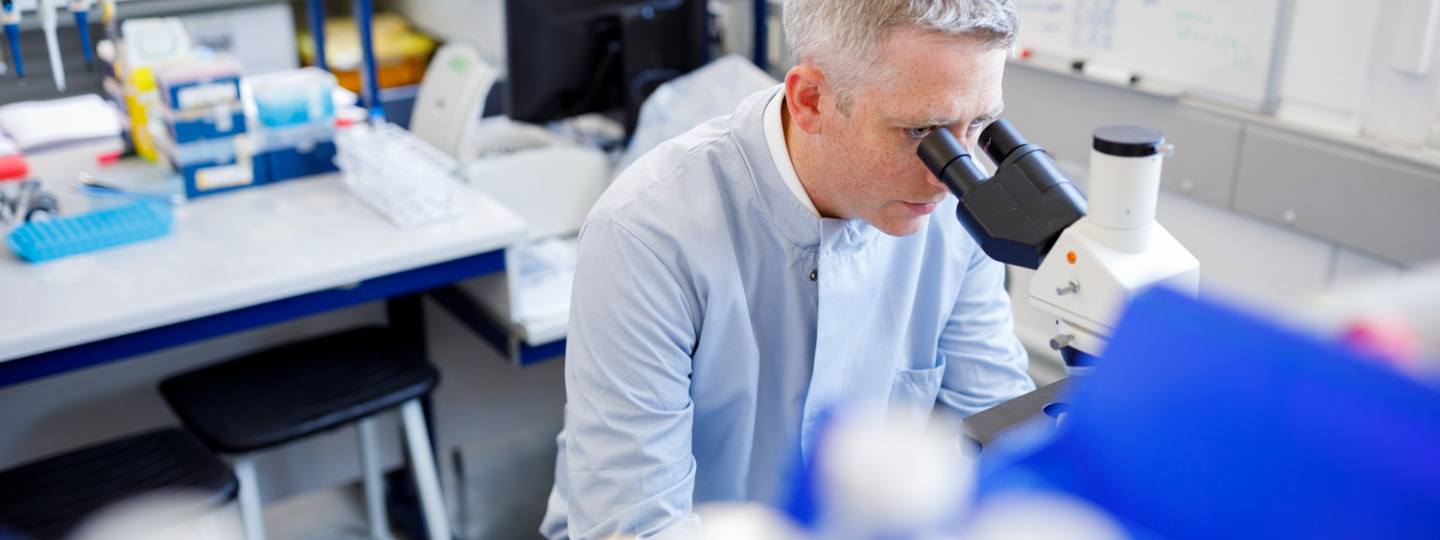
Over the past 20 years, millions of people have accessed life-changing anti-TNF medicines - and its thanks in part to our research.
These medicines revolutionised the way we treat inflammatory arthritis conditions, such as rheumatoid arthritis. psoriatic arthritis, and axial spondyloarthritis. But we aren’t stopping there.
As the largest dedicated funder of arthritis research in the UK, we’re still working tirelessly on new treatments, therapies, and hopefully cures for arthritis – and we’re making real progress.
Here is a sneak peek of some of our trailblazing research findings this year.
Research findings
Retinoic Acid - A new target for hand osteoarthritis?
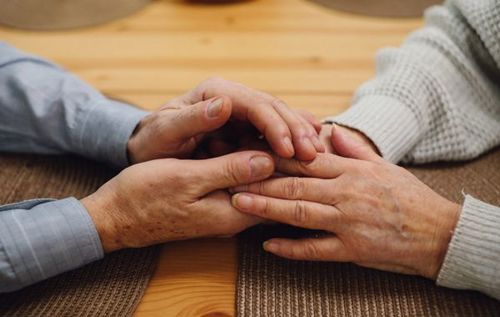 We want to better understand how and why osteoarthritis develops. That’s why we fund research at the Centre for Osteoarthritis Pathogenesis Versus Arthritis led by the University of Oxford.
We want to better understand how and why osteoarthritis develops. That’s why we fund research at the Centre for Osteoarthritis Pathogenesis Versus Arthritis led by the University of Oxford.
This year, the centre found a new potential target for the treatment of hand osteoarthritis (OA). It’s called all-trans retinoic acid (at-RA) and is made from vitamin A.
The researchers found that at-RA could potentially play a key anti-inflammatory role in hand osteoarthritis.
Thanks to these findings, a small study is now underway to test whether a medicine that keeps levels of at-RA high could reduce cartilage inflammation for those waiting for surgery.
Etanercept: Testing biosimilar safety
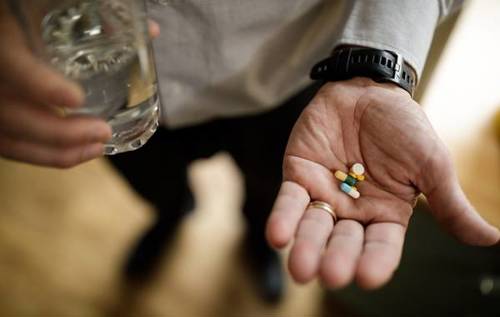 A biosimilar is a highly similar copy of an existing medicine and they’re often more affordable.
A biosimilar is a highly similar copy of an existing medicine and they’re often more affordable.
To ensure the best outcomes for patients, we wanted to test the effectiveness and safety of using biosimilars instead of a medicine called etanercept.
This medicine is often used to treat conditions such as:
- rheumatoid arthritis
- psoriatic arthritis
- ankylosing spondylitis
- juvenile idiopathic arthritis (JIA).
At the Centre of Epidemiology at the University of Manchester, researchers found that people who switched from etanercept to a biosimilar did just as well.
Their condition was just as well-managed, and the biosimilar worked just as well as etanercept. This gives patients and healthcare professionals reassurance when prescribing biosimilars to etanercept.
Covid-Voices – Covid Shielding Report Sent to the Covid Inquiry
 4.1 million people across the UK were identified as clinically extremely vulnerable (CEV) to Covid-19 and were asked to shield during the pandemic.
4.1 million people across the UK were identified as clinically extremely vulnerable (CEV) to Covid-19 and were asked to shield during the pandemic.
Our report, Covid Shielding Voices, revealed the brutal toll of Covid-19 shielding on people with autoimmune arthritis and rheumatic conditions.
Shielders told us that they felt that they had been treated like “second-class citizens” whose needs were ignored. They also spoke about how their mental health was affected by the lifting of lockdowns and removal of support.
People with conditions like rheumatoid arthritis were among this group because their condition and the medicines they are prescribed can weaken the immune system.
This vital piece of research with the University of Manchester gave a voice to the people living with arthritis shielded during the pandemic.
The report also made recommendations, which we gave to the Covid Inquiry. We will continue to promote the report as the second stage of the Covid Inquiry progresses to ensure the voices of people with arthritis are heard.
CLUSTER Consortium: changing how people with lived experience are involved in research.
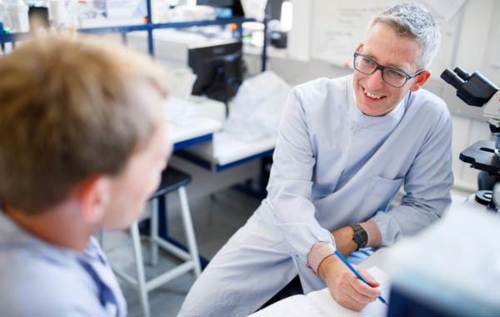 Funded by the Medical Research Council (MRC) and Versus Arthritis, the CLUSTER consortium is a group of researchers who focus on juvenile idiopathic arthritis (JIA) and uveitis.
Funded by the Medical Research Council (MRC) and Versus Arthritis, the CLUSTER consortium is a group of researchers who focus on juvenile idiopathic arthritis (JIA) and uveitis.
Uveitis is an eye condition that causes inflammation in part of the eye called the uvea. You’re at a slightly higher risk of getting this eye condition if you have JIA.
Involving people with arthritis is key to our researchers work. For that reason, our researchers work closely with people who have JIA and uveitis, as well as parents and carers and charity partners. They call them ‘CLUSTER Champions’.
This collaboration helps researchers understand the realities of living with arthritis, so they can make sure that their research is genuinely helpful and relevant.
In their latest paper, CLUSTER worked together with the CLUSTER Champions to create a step-by-step guide about involving patients in research. They also highlighted some of the challenges and barriers that researchers may face.
Celebrating our centres
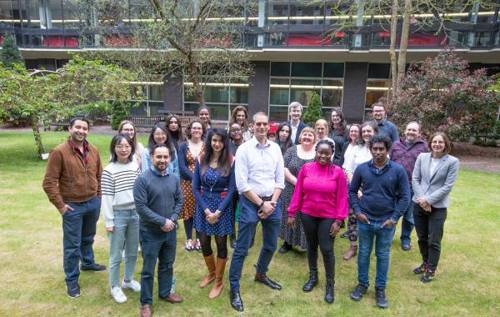 Since 2008, we have invested over £50m in 13 research centres of excellence across the UK.
Since 2008, we have invested over £50m in 13 research centres of excellence across the UK.
Centres are a collection of universities and researchers across the UK working collaboratively. This allows them to share resources and ideas, which can lead to great research outcomes.
This year two of our centres celebrated 10 years of incredible research:
- The Medical Research Council Versus Arthritis Centre for Integrated Research into Musculoskeletal Ageing (CIMA)
- The Medical Research Council Versus Arthritis Centre for Musculoskeletal Ageing Research (CMAR)
One way our centres are making a real difference to people with arthritis is through their research using world-leading cohorts and registers.
A cohort is a group of people who agree to take part in a study for a long period of time. As part of the research, we regularly check in on them, which means we can see how a condition affects them over time. A register is slightly different. It’s a collection of willing patients who donate clinical data (such as blood samples).
When an adult, young person or child is first diagnosed with arthritis there is often uncertainty and concern. They may wonder ‘why me?’, ‘what treatment is out there?’, ‘will it work?’ and ‘what are the side effects?’. Cohorts and registers are a goldmine for collecting the long-term and real-world data needed to answer these questions.
For instance, the British Society for Rheumatology Biologics Register, is managed by our Centre of Epidemiology. It's previously proven that anti-TNF drugs are not associated with an elevated cancer risk, giving reassurance to many people with arthritis.
Centre for Epidemiology Versus Arthritis Impact Report
This year, we also released our very first Centre Impact Report. This celebrates and showcases the amazing impact of the Centre for Epidemiology Versus Arthritis, led by the University of Manchester.
We’ve invested an incredible £4.5mn in this centre over the past decade – and it’s had an amazing impact, touching the lives of people with arthritis right across the continent.
Over the past decade, the Centre has helped us discover:
- How many people in the UK have arthritis and other musculoskeletal (MSK) conditions.
- How effective and safe treatments are for arthritis and other MSK conditions.
- How do arthritis and other MSK conditions progress over time.
Centre Impact Reports will also be produced for all our Centres of Excellence across the next three years.
2023 Career Development Fellowships
We want to support the next generation of researcher leaders. So, this year, we also awarded three prestigious Career Development Fellowships to help researchers take the next step in their career snd deliver more ground-breaking discoveries.
Our Career Development Fellowships provide researchers with up to £750,000 in funding for five years.
We awarded these fellowships to three talented researchers:
- Dr Lianne Kearsley-Fleet, the University of Manchester.
- Dr Erika Kague, the University of Edinburgh.
- Dr Jim Dunham, the University of Bristol.
Lianne aims to fill the gap in knowledge about long-term health-related outcomes in adults with juvenile idiopathic arthritis (JIA). Jim aims to improve treatment for people with fibromyalgia. And Erika wants to improve our knowledge of the underlying causes of osteoarthritis using zebrafish.
Help us continue our incredible research
For too long, arthritis has been dismissed and ignored. But together, we can change that.
We rely on public donations to tackle the challenges faced by the 10 million people living with arthritis in the UK.
The generosity of people like you enables us to make a real difference – from carrying out life-changing research, educating and campaigning, to providing much-needed care and support.